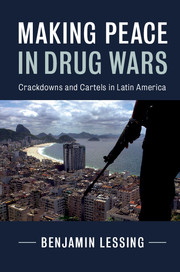Book contents
- Frontmatter
- Dedication
- Contents
- Figures
- Tables
- Preface
- Acknowledgments
- Abbreviations and Acronyms
- 1 Introduction
- PART I A THEORY OF CARTEL–STATE CONFLICT
- PART II CASE STUDIES
- PART III CONDITIONAL REPRESSION AS OUTCOME
- Appendix A Violent-Event Data
- Appendix B List of Interview Subjects
- Bibliography
- Index
- Miscellaneous Endmatter
Appendix A - Violent-Event Data
Published online by Cambridge University Press: 17 November 2017
- Frontmatter
- Dedication
- Contents
- Figures
- Tables
- Preface
- Acknowledgments
- Abbreviations and Acronyms
- 1 Introduction
- PART I A THEORY OF CARTEL–STATE CONFLICT
- PART II CASE STUDIES
- PART III CONDITIONAL REPRESSION AS OUTCOME
- Appendix A Violent-Event Data
- Appendix B List of Interview Subjects
- Bibliography
- Index
- Miscellaneous Endmatter
Summary
Figures 3.4, 5.2, 6.2, and 6.3 present descriptive statistics from the NRI/ OBIVAN dataset of coded newspaper reports of cartel-related violent events in Colombia, Mexico, and Rio de Janeiro, Brazil, produced by the author. This appendix offers a brief summary of the dataset and the coding methodology employed.
For each case, the universe of cartel-related violent events was collected from newspaper reports over the relevant period, manually in Colombia (1984–1993), and using digital search algorithms in Mexico and Brazil (2002–2012). Relevant reports were then manually coded by native-speaker research assistants working at partner NGOs in each country. Reports were collected from multiple newspapers, but coding was only completed for the leading national newspaper in each case: El Tiempo in Colombia, Reforma in Mexico, and O Globo in Brazil. Some 30,000 events have been coded to date.
A single coding methodology was adopted for all three countries: the unit of analysis is the violent event, which in turn is composed of one or more actions contiguous in time and place. Actions are coded by type, protagonists, affected groups, outcomes (death tolls, drug and arms seizures, arrests, etc.); the event as a whole is coded for date and location. Some actions are not considered violent, such as police patrols, seizures, arrests, etc., but are coded as sequential components of events that contained other violent actions.
A long list of action types (such as “assassination,” “kidnapping,” “arson,” and so on) and corresponding criteria was developed to accommodate the particularities of the three cases. However, a single action type, “clash,” was used across cases to code any situation in which two or more groups exchange lethal force. All other violent actions are considered “unilateral actions.” All clashes have at least two protagonists, though one or more may be unidentified.
Figure 6.3 examines the universe of event reports that included one or more clashes for Rio de Janeiro, regardless of the protagonists involved. In the left-hand chart, all clashes between organized criminal groups and state forces are categorized as “Cartel vs. State.” Only clashes in which both protagonist could be identified as organized criminal groups were categorized as “Cartel vs. Cartel.” Clashes involving individuals as at least one of the protagonists were excluded.
- Type
- Chapter
- Information
- Making Peace in Drug WarsCrackdowns and Cartels in Latin America, pp. 299 - 300Publisher: Cambridge University PressPrint publication year: 2017



